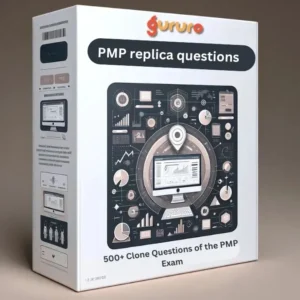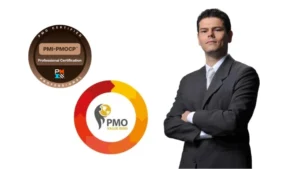Project management professionals constantly seek new ways to advance their careers and improve their skills. One of the field’s most respected and recognized certifications is the PMI Program Management Professional (PgMP) credential.
This blog post will cover Everything you should know about PMI PgMP, including the eligibility requirements, benefits, exam and preparation, certification maintenance, and frequently asked questions (FAQs). Whether you’re already a program manager or aspire to be one, this post will provide valuable information to help you decide if your PgMP certification is proper.
What is PMI PgMP?
PMI Program Management Professional (PgMP) is a globally recognized certification from the Project Management Institute (PMI). This certification is designed for experienced program managers with a proven track record of successfully leading and directing multiple related projects to achieve strategic business goals.
The PgMP certification recognizes an individual’s ability to manage multiple projects aligned with an organization’s strategic objectives and interdependent and interrelated. It is a higher level certification than the PMP (Project Management Professional) and requires a more advanced level of knowledge, experience, and skill.
The PgMP certification focuses on the following areas:
- Strategic program management
- Governance
- Benefits management
- Stakeholder management
- Program life cycle management
Earning a PgMP certification demonstrates a commitment to the profession and signifies that an individual has the experience and knowledge to manage multiple projects and achieve strategic goals effectively. It is also a valuable asset for professionals seeking to advance in their careers, as it can lead to increased earning potential and better job opportunities.
Differences between PMP and PgMP
The PMP (Project Management Professional) and PgMP (Program Management Professional) certifications are both offered by the Project Management Institute (PMI) and are widely recognized in the project management industry. However, there are some critical differences between the two certifications:
- Scope: The PMP certification focuses on managing individual projects, whereas the PgMP certification focuses on managing multiple related projects aligned with an organization’s strategic objectives.
- Experience: The PMP certification requires a minimum of 3-5 years of project management experience, while the PgMP certification requires a minimum of 6-10 years of program management experience.
- Examination: The PMP certification exam focuses on project management knowledge and best practices, while the PgMP certification exam focuses on program management knowledge and best practices, including governance, benefits management, stakeholder management, and program life cycle management.
- Application process: The PgMP certification process is more rigorous than PMP. It includes an additional step of passing an eligibility review.
- Career level: The PMP certification is more entry-level, whereas the PgMP certification is more advanced.
- Renewal: Both PMP and PgMP certification holders are required to earn 60 professional development units (PDUs) every 3 years.
- Focus: PMP focuses on the project management knowledge areas such as integration, scope, time, cost, quality, resource, and communication management. On the other hand, PgMP focuses on program management knowledge areas such as program strategy alignment, program governance, benefits management, stakeholder management, and program life-cycle management.
- Role: PMP certification holders primarily focus on the day-to-day management of the project, whereas PgMP certification holders have a more strategic role and are responsible for aligning multiple projects with the organization’s overall objectives and managing the interdependencies between the projects.
- Career Advancement: A PMP certification can open doors to entry-level project management roles. On the other hand, PgMP certification holders are typically in leadership roles and have a more strategic role in an organization.
In summary, both PMP and PgMP certifications are widely recognized and respected in project management. Still, they are targeted at different levels of experience and focus on project and program management aspects. Therefore, professionals should carefully evaluate their career goals and experience to decide which certification best fits them.
To be eligible for the PMI Program Management Professional (PgMP) certification, individuals must meet specific education and experience requirements set by PMI. These requirements are:
- Education: Candidates must have a secondary degree (high school diploma, associate’s degree, or the global equivalent)
- Experience: Candidates must have at least 6 years of experience in program management, of which at least 4 years must be in a program management role responsible for managing program interrelated projects and leading cross-functional teams.
- Pass an eligibility review: Candidates must pass an eligibility review process before registering for the PgMP exam. The review process is designed to confirm that a candidate has the required level of education and experience.
- Exam: Candidates must pass the PgMP exam, a computer-based test consisting of 170 multiple-choice questions. The exam is based on PMI’s Standard for Program Management and covers the following knowledge areas: strategic program management, governance, benefits management, stakeholder management, and program life cycle management.
It’s worth noting that PMI recommends that candidates have a minimum of 8,500 hours of program management experience, 4,500 hours of which should be in a leadership role, before attempting the PgMP certification.
Eligibility Requirements for PgMP
Benefits of Earning a PgMP
Earning the PMI Program Management Professional (PgMP) certification can bring many benefits to professionals in the project management field. Some of the key benefits include:
- Career Advancement: PgMP certification holders are recognized as highly skilled program managers and are well-positioned to advance in their careers. The PgMP certification is a globally recognized and respected credential. It demonstrates an individual’s commitment to the profession and ability to lead and manage multiple related projects that align with an organization’s strategic objectives.
- Increased Earning Potential: PgMP certification holders are typically in leadership roles and have a more strategic role in an organization. They often command higher salaries and better benefits than non-certified program managers.
- Recognition as a Professional: PgMP certification holders are recognized as professionals who have met rigorous education and experience standards and have passed a thorough exam. This recognition sets them apart from non-certified program managers and gives them a competitive edge in the job market.
- Professional Development: Maintaining a PgMP certification requires earning professional development units (PDUs) every three years. This ensures that PgMP certification holders are up-to-date with the latest trends and best practices in program management and helps them continue improving their skills and knowledge.
- Networking: PgMP certification holders have access to a network of certified professionals and can participate in PMI events and activities which provide opportunities for professional development and networking.
- Global Recognition: PMI is a globally recognized organization, and the PgMP certification is recognized and respected in the program management field worldwide. This can be an advantage for professionals who aspire to work in a global environment or plan to work in different countries.
PgMP Exam and Preparation
The PMI Program Management Professional (PgMP) certification exam is a computer-based test consisting of 170 multiple-choice questions. The exam is based on PMI’s Standard for Program Management and covers the following knowledge areas: strategic program management, governance, benefits management, stakeholder management, and program life cycle management. The exam is in English and is available at authorized testing centers worldwide. Additionally, PMI offers a variety of study materials and resources to help candidates prepare for the exam. These include:
- PgMP Exam Content Outline: This document outlines the exam content and provides a breakdown of the knowledge areas covered on the exam.
- PgMP Handbook: This handbook provides detailed information about the PgMP certification, including the eligibility requirements, exam format, and certification process.
- PgMP Study Guide: This guide provides an overview of the program management knowledge areas covered on the exam and includes sample questions and exercises to help candidates prepare.
- PgMP Practice Exam: PMI offers an online practice exam that simulates the actual exam and allows candidates to test their knowledge and identify areas where they need additional study.
- PgMP Review Courses: PMI offers classroom and online review courses that provide in-depth instruction on the program management knowledge areas covered on the exam.
- PgMP Study Groups: PMI offers online study groups that provide a forum for candidates to share study tips, ask questions, and receive support from other PgMP candidates.
In addition to the above resources, candidates are encouraged to take practice exams, review the PMBOK guide and other PMI standards, and seek out additional study materials such as flashcards, videos, and books.
It’s important to note that the PgMP exam is challenging and requires a significant amount of time, effort, and dedication to prepare for. Therefore, it’s recommended that candidates give themselves ample time to study and only take the exam if they feel confident and well-prepared.
Maintaining Your PgMP
Maintaining your PMI Program Management Professional (PgMP) certification is an ongoing process that requires you to earn and report professional development units (PDUs) every three years. PDUs measure your continuous learning and professional development in program management.
You must earn 60 PDUs within the three-year certification cycle to maintain your PgMP certification. You can achieve these PDUs through Gururo.
PMI PgMP cost
The cost to pursue the PMI Program Management Professional (PgMP) certification can vary depending on factors such as the location and the type of study materials and resources used. However, the general costs associated with obtaining the PgMP accreditation include the following:
- PMI Membership: To be eligible to take the PgMP certification exam, you must be a member of PMI. PMI membership costs $99 for individual members.
- Exam fee: The PgMP certification exam costs $800 for PMI members and $1,000 for non-members.
- Study materials: PMI offers a variety of study materials, including the PgMP Exam Content Outline, the PgMP Handbook, the PgMP Study Guide, the PgMP Practice Exam, and the PgMP Review Courses. The cost of these materials can vary.
- Review courses: PMI offers classroom and online review courses that provide in-depth instruction on the program management knowledge areas covered on the exam. The cost of these courses can vary depending on the provider and location.
- Application fee: When submitting the PgMP application, there is an application fee of $150.
is pgMP better than pMP
Both certifications are globally recognized and respected in project management. Still, the PgMP is more advanced, targeted at experienced program managers, and focused on managing multiple related projects aligned with an organization’s strategic objectives. It depends on an individual’s experience and career goals to determine which certification suits them best.
PMI PgMP salary
The salary for a PMI Program Management Professional (PgMP) certification holder can vary depending on location, industry, and years of experience. However, on average, PgMP-certified professionals tend to have a higher salary than non-certified program managers.
According to PMI’s Earning Power: Project Management Salary Survey, PgMP certification holders reported a median salary of $135,000 annually in the United States. This is higher than the median salary of $112,000 per year reported by non-certified program managers.
It is worth noting that PgMP certified professionals typically have a more strategic role in an organization and command higher salaries and better benefits than non-certified program managers. Additionally, a PgMP certification may open up more opportunities for advancement and higher-paying positions.
PMI PgMP handbook
The PMI Program Management Professional (PgMP) Handbook is a guide provided by the Project Management Institute (PMI) that includes detailed information about the PgMP certification, including the eligibility requirements, exam format, and the certification process. The handbook is available for free download on the PMI website, and it covers the following topics:
- Overview of the PgMP certification
- Eligibility requirements
- How to apply
- Exam format and content
- Exam preparation resources
- Maintenance of the certification
- Professional development
- Code of Ethics
- Recertification
- Policy and procedures
PMI PgMP certification training
PMI offers a variety of training options for individuals interested in pursuing the PMI Program Management Professional (PgMP) certification. These options include:
- Self-study: PMI provides a variety of study materials, such as the PgMP Exam Content Outline, the PgMP Handbook, the PgMP Study Guide, and the PgMP Practice Exam, You can use that for self-study.
- Online courses: PMI offers online review courses that provide in-depth instruction on the program management knowledge areas that will be covered on the exam. These courses are led by experienced instructors and include interactive activities, quizzes, and practice questions.
- Classroom training: PMI also offers classroom training for the PgMP certification. These training sessions are led by experienced instructors and provide an opportunity for individuals to learn and interact with other PgMP candidates.
- Study groups: PMI offers online study groups that allow candidates to share study tips, ask questions, and receive support from other PgMP candidates.
- PMI Chapter training: Many PMI local chapters offer PgMP certification training courses. These courses are usually led by experienced PMP and PgMP-certified professionals and can provide valuable insights, tips, and tricks for the exam.
PMI PgMP books
There are several books available that can help individuals prepare for the PMI Program Management Professional (PgMP) certification exam. Some popular choices include:
- “The PgMP Exam: How to Pass on Your First Try” by Andy Crowe: This book is a comprehensive guide to the PgMP exam, and it covers all the knowledge areas that will be tested on the exam. It includes practice questions, tips, and strategies for passing the exam.
- “PgMP Program Management Professional All-in-One Exam Guide” by Joseph Phillips: This book covers all the knowledge areas of the PgMP exam and includes practice questions, test-taking strategies, and a CD with additional practice questions.
- “Program Management Professional (PgMP) Exam Study Guide” by David L. Cleland and Ralf Müller: This book covers the knowledge areas of the PgMP exam and includes practice questions and test-taking strategies.
- “PMI Program Management Professional (PgMP) Certification Exam Study Guide” by David Morris: This book covers the knowledge areas of the PgMP exam and includes practice questions and test-taking strategies.
- “PMI-PgMP Exam Practice Test and Study Guide” by Scott J. J. Jardine: This book provides an overview of the PgMP exam and includes practice questions and test-taking strategies.
PMI PgMP panel review
The PMI Program Management Professional (PgMP) Panel Review is an additional step in the PgMP certification process for candidates who have passed the PgMP examination. The Panel Review evaluates the candidate’s program management experience through a panel of experienced PgMP certified professionals.
The Panel Review process is designed to confirm that the candidate’s experience meets the rigorous standards set by PMI for the PgMP certification. In addition, the panel evaluates the candidate’s responses to the experience verification questions, part of the PgMP application, to determine if the candidate has the necessary program management experience to be awarded the PgMP certification.
The Panel Review process is conducted through an online platform, and the panel members review the candidate’s responses independently. After the review, the panel members recommend whether the candidate’s experience meets the standards for the PgMP certification.
It’s important to note that not all candidates are selected for the Panel Review, and the decision to invite a candidate for the Panel Review is based on a random selection. Also, it’s essential to provide complete and accurate responses to the experience verification questions, as the panel members will base their recommendations on the information provided.
is pgMP harder than pMP
how many pgMP certified in the world?
Can i do pgMP without PMP
It is technically possible to pursue the PMI Program Management Professional (PgMP) certification without first obtaining the Project Management Professional (PMP) certification as long as you meet the eligibility requirements for the PgMP certification.
PgMP vs. pMP salary
On average, PgMP certified professionals tend to have a higher salary than PMP certified professionals.
According to PMI’s Earning Power: Project Management Salary Survey, PgMP certification holders reported a median salary of $135,000 annually in the United States. This is higher than the median salary of $116,000 per year reported by PMP certified professionals.
is pgMP better than PMP
Both certifications are globally recognized and respected in project management. Still, the PgMP is more advanced, targeted at experienced program managers, and focused on managing multiple related projects aligned with an organization’s strategic objectives. It depends on an individual’s experience and career goals to determine which certification suits them best.
Is the PgMP certification worth it?
Whether or not the PgMP certification is worth it depends on an individual’s career goals and experience. The PgMP certification can be a valuable asset for experienced program managers looking to advance their careers and demonstrate their ability to lead and manage multiple related projects that align with an organization’s strategic objectives. In addition, the PgMP certification is globally recognized and respected and can lead to career advancement, increased earning potential, recognition as a professional, professional development, networking, and global recognition.
However, it is crucial to consider the costs and efforts of obtaining the certification, including exam fees, study materials, and review courses.
Conclusion : Everything You Should Know About PMI PgMP
In conclusion, the PMI Program Management Professional (PgMP) certification is a globally recognized and respected credential for experienced program managers. It demonstrates an individual’s ability to lead and manage multiple related projects that align with an organization’s strategic objectives.

















